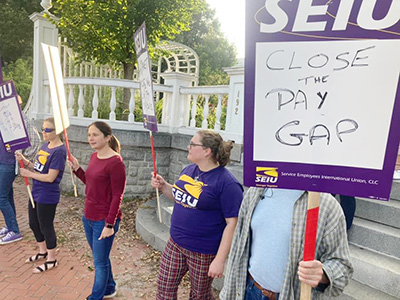Bargaining News
|February 13, 2024
Loop of inefficiency at Maine Revenue Services caused by short staffing, low pay

MSEA-SEIU Member Sarah Gardner’s testimony in support of LD 2121, An Act to Address Chronic Understaffing of State Government Positions, sponsored by Representative Drew Gattine:
February 7, 2024
Senator Nangle, Representative Stover, members of the Committee on State and Local Government, my name is Sarah Gardner from Lisbon Falls, and I’m here on my own time as a member of my union, MSEA, and as a private citizen in support of LD 2121, An Act to Address Chronic Understaffing of State Government Positions.
I have been with the State as a sales tax auditor since August 2023. I like my job and want to stay long term. However, low pay throughout the State is causing serious issues which need resolution now. I am asking you as fellow Mainers and public servants to help us achieve those goals by voting in favor of LD 2121. I have a few relevant points to bring to your attention.
Myself and those hired with me were brought in at Step 8, which until recently, was the highest step on the pay scale. The fact that the State must hire people in at this level is a major red flag. It is evidence that people will no longer work for lower salaries because they cannot afford to, and because they can find better pay in the private sector. No one should be making less than $20/hr. I have family members and friends in the State who earn less than that. It’s degrading.
On January 30th, the Governor approved recruitment and retention payments for some workers in DHHS. Of course, those workers deserve it, but these payments are inefficient and categorically misleading. My colleagues and fellow union members fought for across the board wage increases in 2023, but we were given a last, best, final offer that included a one-time, lump-sum of $800 in lieu of retro pay, which after taxes was closer to $570. This came this February, 8 months after the expiration of our last contract, and due to high bonus tax rates, we were taxed at a higher-than-normal rate. We are happy to have some increases, but this does not come close enough fix the root of the State’s ongoing recruitment and retention issues we need to see fixed.” Lump-sum bonus payments and “stipends” tacked on to pay rates are short term solutions, when what we need is hourly raises across the board, especially for those on the lower end of the pay scale. The State knows and admits there is a problem, as proven by Mills’ efforts to recruit and retain staff. At the same time, State officials are now denying the existence of a pay gap. This cognitive dissonance needs to be addressed. We know Maine has had hundreds of millions of dollars in surpluses now and in recent years, yet there is a refusal to channel these funds to swiftly resolve these ongoing staffing shortages.
The State Tax Assessor held a meeting with staff on January 8th in which he admitted the State is facing a recruitment and retention problem. During the meeting, he informed sales tax staff that due to high staffing shortages, there is a likelihood we will be redirected to answer income tax phones for the income tax filing season. Changes like these are too common and create a loop of inefficiency. People in both the income and sales divisions must set aside time to teach and learn a whole new subject. Training that is intended to take 4 weeks is compressed into a few hours. It creates liability and a general “bad look” for the State when they have untrained people answering taxpayers’ financial questions. It is inefficient because when untrained people take calls, anything beyond a simple “where’s my refund?” question will have to be placed on a callback sheet for the income division to revisit. This wastes taxpayer time, and the time of employees in both divisions. We are already short staffed, and executive decisions like these only serve to worsen the problem that can only be solved with higher pay. It is clear to many employees that this is a decision made by leaders who are out of touch with reality.
There is a simple solution to the recruitment and retention problem, and it is to pay people more. Please vote in favor of LD 2121 and support your colleagues so we can provide better services for the people of Maine.
Thank you for your time.
Sarah Gardner